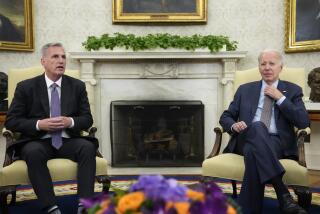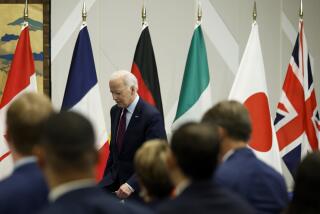Reagan Insists on Fair Deal at Arms Talks
- Share via
WASHINGTON — President Reagan announced Wednesday that he has instructed his arms control negotiators to “get up from the table and come on home” if the Soviet Union resists an equitable agreement.
Meeting privately at the White House with members of the House Appropriations Committee, the President also sought to rally bipartisan support for a continued military buildup by declaring that the Soviets will view any cuts in defense spending by Congress as weakness on the part of the United States. His remarks later were made public by White House Deputy Press Secretary Larry Speakes.
“The Soviets do not distinguish between Republicans and Democrats, conservatives and liberals, legislative and executive branch,” the President said. “They will be looking for evidence of continued U.S. resolve or breaks in that resolve, which will lead us to unilateral reductions without the Soviets’ having to do a thing.”
Reagan’s plea appeared to go unheeded. Rep. Joseph P. Addabbo (D-N.Y.), chairman of an Appropriations subcommittee on defense, said after emerging from the meeting that there is “a very good chance” Congress will deny the President the funds for the MX missile.
In addition, Senate Republican leaders reported Wednesday that they finally are making progress toward agreement on a deficit-reduction plan that would trim defense spending.
“No one wants peace more than I,” Reagan told the House members. “Nobody wants the (nuclear) genie put back into the bottle more than I do. But wishing will not make it so, nor will a rush to any kind of arms control agreement.
“I’ve told our negotiators, if they don’t have a good agreement, get up from the table and come on home. The only thing more dangerous than no agreement is a bad agreement.”
The White House did not indicate when Reagan delivered the instructions to his arms negotiating team, or whether he had set a deadline for reaching agreement. The talks are scheduled to begin March 12 in Geneva.
Argued Strenuously
Speakes said the President wants his words made public to emphasize the need for bipartisan support from Congress. “First, he needs bipartisan support for a negotiating position, which we believe we have,” he said. “Second, we need bipartisan support for defense (spending), which we want.”
According to those who attended the meeting, Reagan argued strenuously for continued production of the MX missile as well as continued funding for research on a “Star Wars” space defense system. He indicated that both programs are essential to the U.S. bargaining position in Geneva.
“This view was questioned by a number of people,” said Rep. Robert J. Mrazek (D-N.Y.). “The mood is very clear in the House--certainly on the Democratic side--that if there are not going to be substantial cuts in the defense budget, then the kind of cuts (Budget Director David A.) Stockman is looking for in . . . Amtrak and mass transit and farm programs aren’t going to be there.”
In the Senate, Majority Leader Robert J. Dole (R-Kan.) said Republicans are moving toward agreement on a plan to trim $50 billion from the projected deficit in the 1986 fiscal year beginning next Oct. 1. He said they are close to agreement on how much to cut domestic spending but acknowledged that there still are some differences among the GOP leaders over how much to trim defense spending.
Armed Services Committee Chairman Barry M. Goldwater (R-Ariz.), who previously has resisted trimming Reagan’s defense budget, indicated some flexibility after a meeting with other Senate Republican leaders. He said he would favor military spending of $310 billion to $320 billion in 1986. Defense Secretary Caspar W. Weinberger has requested $314 billion.
More to Read
Get the L.A. Times Politics newsletter
Deeply reported insights into legislation, politics and policy from Sacramento, Washington and beyond. In your inbox three times per week.
You may occasionally receive promotional content from the Los Angeles Times.










